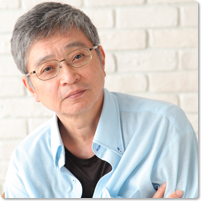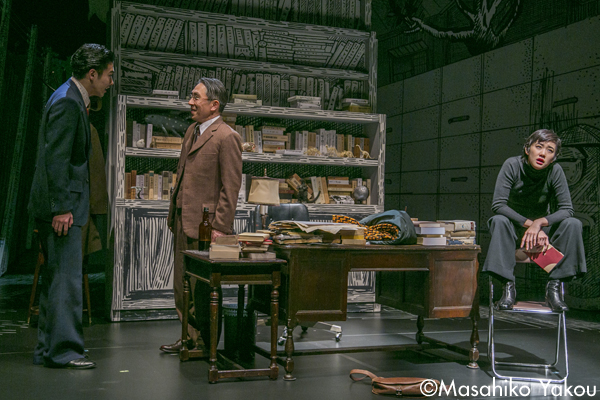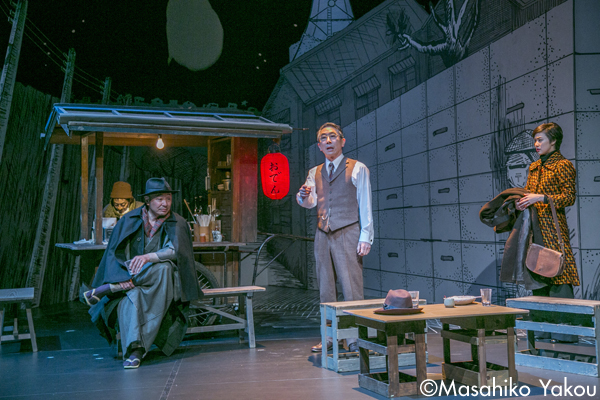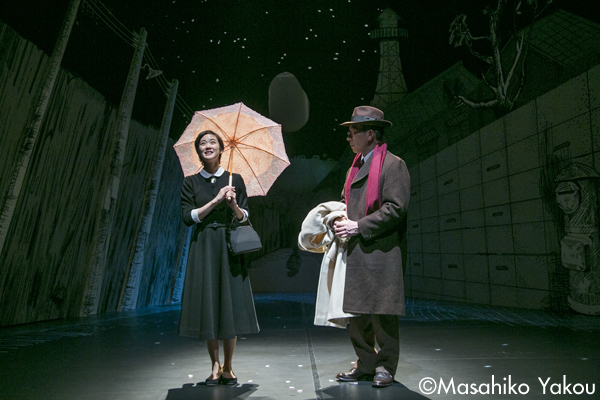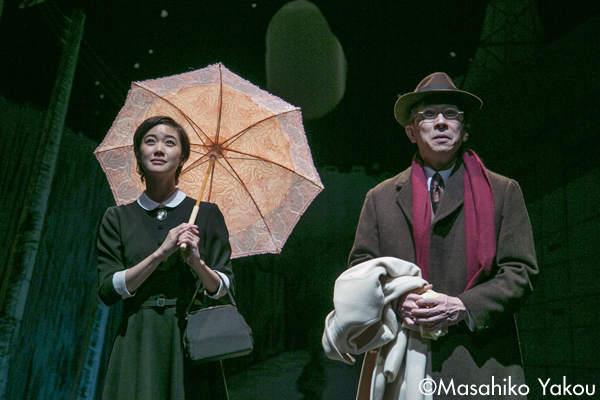The Japanese Literature Series
- Congratulations on winning the Tsuruya Namboku Memorial Award. Your award-winning work is an adaptation from the unfinished novel Goodbye that the famous author Osamu Dazai (1909-1948) was writing when he took his own life. The story is about a man who devises a scheme to break off the relationships with his ten mistresses that involves hiring a woman of exceptional beauty and taking her with him to visit each of the mistresses and inform then the he is engaged to marry her. That is the kind of man it is about. But, you turn it into a love romance about the selfless love of an aging man who has lost his beloved wife. What made you decide to write a series of plays based on the works of famous figures in Japanese literature? And, what made you decide to choose this particular work?
- Originally, I didn’t have any interest in true Japanese literature at all. From childhood I liked entertainment type fiction like the ninja arts and magic stories of Futaro Yamada. Regarding true literature, about the only authors I read were Ryunosuke Akutagawa, Ango Sakaguchi and Osamu Dazai, and I had never even read all the works of Soseki Natsume. So, I thought maybe I would take this opportunity to read some (laughs). Since Goodbye is an unfinished novel, it was like I thought I would give it a good finish! I knew I couldn’t compete with Dazai doing it as a novel, but maybe I could show that I’m better at play writing! (Laughs)
- The situation of trying to break off ties with a number of mistresses is the same, but from there you make the play quite different. You make it into a love romance in which, in order to replace the love he had for his deceased wife, the aging man is supporting a number of women in need without asking anything in return, and is preparing to take the first step toward a new love.
- You could call it a case of developing the areas that relate to your own life and emotional state. For example, when you take a middle-aged man and place him in the context of one entering old age, you have the events of his past, but you also have a time of life when various things are naturally beginning to change.
- Just after you wrote Hogiuta (Ode to Joy) , you also wrote a play that referred to Dazai’s Goodbye . In that work the setting was the Tamagawa Josui waterway [where Dazai committed suicide] and the characters included the author and his editor and a couple of strange beggar-like characters named Gesaku and Kyoko.
- The play this time is completely different. That time just after Hogiuta was a time when I was thinking of quitting my work in theater, and by writing a work called Goodbye , I was thinking it might be a good way to say goodbye to it all (laughs).
- So, Dazai was one of the authors in true literature that you liked, wasn’t he?
- Yes. Dazai, and I like Ango [Sakaguchi]. Among Ango’s early works, I think Kogarashi no Sakagura kara and Kaze Hakase (Doctor of Wind) are good. I particularly like his essays, and the word farce that he discusses in his essay “About Farce” (*1) is theater-oriented and one that I liked very much. He wrote that farce has the power to negate everything, be it the Yes and No dichotomy, this ideal or that, everything. As for Dazai, he was skilled at everything, be it short stories, novels or whatever. Also, his skill at writing dialogues between characters is amazing; he is able to give the reader the feeling that you are the only one being allowed to read the conversation.
- Dazai, with the distinct rhythm of his prose and Ango [Sakaguchi], with his somehow broken down prose style, are both writers who are liked by some but disliked by others. It seems to us that there are few people who like them both.
-
It seems that in my case, I like Dazai’s prose, but when I write, it comes out as Ango style prose. None of it is intentional, but people tell me that when they read my prose carefully it has a clear Ango style.
Since I became a writer, I have always thought from my younger years that there are two things that I must transcend as a writer, two things that I must find a position relative to and with objectivity toward. Those two were Dazai and the author of Hatachi no Etude (*2) , Tozo Haraguchi. With regard to Dazai, I felt that I had found some relativity after reading works by Takaaki Yoshimoto. As for Hatachi no Etude , it has continued to defeat me. It made me feel that I can’t give up writing until I can match it. - We are told that the subject of the second work of your Japanese Literature Theater series is the author Soseki [Natsume].
- When Kyōko Azumi, formerly of the Culture Dept. of the Nagoya office of the Yomiuri newspaper whom I have frequently been fortunate to work with, won the Watsuji Tetsuro Literary Award for her book “Kusamakura” no Nami to Shingai Kakumei , I decided to do Kusamakura (*3) myself (laughs). That was the first time I read it.
- What was your impression of it?
-
When I read
Kusamakura
, I was very impressed by the accelerating speed of the story. I wasn’t expecting that. The accelerating effect is created by the story’s heroine, Nami; her role makes the story accelerate faster and faster. I enjoyed that sensation, and you could say that it surprised me a bit. My play based on the story is already finished, but the contents are still secret. In fact, my third play of the Japanese Literature Theater series is also finished, but I can’t reveal what it is about yet, either. (Laughs)
Soh Kitamura’s journey
- One of your representative works is the play Hogiuta . The story is set in a post-nuclear-Holocaust world. A pair of traveling performers named Gesaku and Kyoko who go around to perform in rubble-strewn towns pulling their possessions in a pull-cart. Then they meet a character named Yasuo, and with Gesaku being a playwright and Yasuo possibly being a Christ figure (Yaso being the Japanese reading of Jesus [Christ]), it is possible to read a number of layers of meaning and different interpretations into the play.
- Until recently, I myself couldn’t understand at all what Hogiuta was really about. I was 22 or 23 at the time and had begun to suffer from depression, which made my body painfully heavy. Even when I sat or laid down, it didn’t get better. But still, I had to write, so I would rest for a while, then write for a while and keep repeating that cycle on and on. My mind wasn’t functioning well either, so I would lay the dictionary beside me, close my eyes and leaf through the pages and then point blindly at a word. If the word happened to be “comb” I would say, is that so, and then begin to think of ways to work the word comb into the story. That is basically how I was writing.
- When we hear that it always amazes us how well the storyline comes together nonetheless. It was in 1970 that you started your company T.P.O. Shi-dan in Nagoya, so it has now been about 45 years. Are there any ideas about theater that have remained the same in you from that time until today?
- Once in the past, when I took Hogiuta to the Seoul Theater Festival in South Korea, the festival’s artistic director asked me directly what theater meant to me. So I answered, “If I were to express it in a word, theater is the images battling in my mind, the toy box that is an overturned life.” The unchanging feeling I have all these years is that of playing out life in theater, squandering the emptiness of a fleeting life in theater; the feeling that theater is “ Kyomu e no Kumotsu ” (*4) .
- Have you ever considered pursuing a career other than theater-making?
- There was one time when I reached the point where I had to decide if I was going to continue theater even if I couldn’t earn a living at it or give it up and become a company employee or something. In fact, I even got a job at a company that publishes children’s books. But, I quit after a week. I knew it wasn’t work that I could spend my life at. So, if that was the case, I made the decision to throw my life away [on theater] for real. When I told a friend about my decision, he told me it wasn’t a case of me throwing my life away but life throwing a life at you. That was at a time before I was able to make a living in theater, but I was young and doing theater was interesting and fun for me. Theater is not an occupation or a professional, it’s a way life for people who can’t do anything else (laughs).
- That was truly your T.P.O. Shi-dan period, wasn’t it?
- Yes, it was at that time. At the time I was imitating the theater of Juro Kara. At university I was being a fake student, and at that time when the [small] theater world was divided between Jura Kara’s Red Tent style and Makoto Sato’s Black Tent style, I was the only one at my school who liked the Red Tent better. The Black Tent school was seen as more intellectual, wasn’t it? But, I couldn’t help feeling that Kara’s plays were more interesting. Now, 45 years later, I find that in a number of ways, I have returned lately to Kara’s style of theater. Although it is different with the work I am commissioned to do for other companies, the scripts I write for my own productions with the “avecbeads” unit in Nagoya definitely have a Juro Kara touch.
- Is there any particular principles that you hold to with pride as a playwright?
- It is not really such a big thing, but something that I never permit myself to do is to write things with the purpose of winning the sympathy of the audience. Even with the entertainment type works I am commissioned to write, this is a rule I always stick with.
- So, what is it that you rely on when you write?
- It connects to what I was talking about earlier. For me, theater is a toy that I enjoy playing with tremendously, and I really love the process of writing itself. So, if I am not enjoying it, the words don’t flow and I can’t write. No matter what kind of job I may be commissioned to write for, I always have to find a way to make it enjoyable.
- That is an aspect that you seem to have in common with Juro Kara, whom you respect so much. The theater director Tadashi Suzuki describes Juro Kara’s plays “expressions of a child’s heart,” and in a similar vein, it seems that you have a talent for playing with theater like boys play at sword fighting.
-
Both of my parents had full-time jobs when I was a child, so there was no one at home when I got home from school. So, I would go out to play with the other kids in the neighborhood, but when it got to be 5:00 in the evening I would have chores that I was supposed to do before my parents got home, like preparing the bath and such, which meant that I always had to leave while the others were still playing. That made the other kids mad and caused them to complain about me cruelly. If we were playing baseball, the others would say, “You always leave in the middle of the game, so we won’t let you in our game.” So, I couldn’t play with the neighborhood kids anymore. That left me with no alternative but to play by myself.
You know what I did? I played catch by myself, using a wall. And as I did, I would make up situations or stories in my head: “There is the pitch. The batter is running to first base.” I was something of a precocious child and was already reading things like Futaro Yamada’s The Kouga Ninja Scrolls and the manga Kagemaru of Iga , so I would invent stories like a team of ninjas battling through the round robin stage of a tournament and getting beaten, or I would stage imaginary battles between stones I had picked up. In those ways I was always playing by myself.
When I began writing scenarios on the word processor, it was with the same sense [of play] that I made up games with as a child. It’s not that I’m a genius with a god-given gift, but I can create stories. I can create them as I wish. And, because I can create them at will, I can play at will. In that sense, it is truly a form of play. - Another of your representative works is the play Soko – Ginga Tetsudō no Yoru (A scenario draft on [Kenji Miyazawa’s novel] “Night on the Galactic Railroad”). Since seeing this play for the first time, the feeling is that there was always a character absent and that absence gives the play as a whole its special sadness. For example, when the characters Giovanni and Campanella are standing together looking off into the distance and saying there is someone out there waving at them, that third person never actually appears. Also, in the scene where Giovanni is with his mother, we only hear her voice and she never appears on stage. There are many places throughout the play where there is that sense of loss and absence.
- I am not consciously writing it that way, but I do believe there is that kind of sense somewhere in my subconscious. There is that sense of loss because someone is absent. In addition to that, “sadness” is a feeling that I understand well, whereas I don’t really understand the feelings of “joy” and “love,” but I do have a clear association with the emotion we call sadness. To write the word mournful ( aisetsu ) you can just use the first character ( ai ) of the compound to give the meaning of sadness, or you can use the first character of the compound aijo (love) for the same meaning. So, in my writing, things tend to gravitate in that direction. It is not something that I do consciously.
- I know that you like ruins and have traveled to see places like Mohenjo-daro. Is this also related to the sense of loss and absense?
-
Ruins are places where there is nothing left to be lost. All has been lost and all is finished, so ruins can give you a sense of confident assurance. It is an assurance that comes from knowing that all has ended, and that is what I like about ruins. One thing I can say for sure is that I don’t really know the feeling that people call loneliness or aloneness. A sense of loss is a feeling, but I have never felt like, “I am alone and lonely” and I have never been worried by a sense of being alone. It is hard for me to explain, but it seems to me that there is nothing as pleasant as being alone. (Laughs)
What he wants to convey to young playwrights
- For about 20 years you have led the Itami Soryu Shijuku course/seminar for aspiring playwrights held at AI HALL in Hyogo. We have heard that you tell these young aspiring playwrights to discard story[telling] and themes (subjects) when they write.
-
That’s right. That is what I tell them to begin with. It’s because, having a theme or trying to tell a story only gets in the way and makes it difficult to write. So, I tell them to discard those ideas to begin with. Then I tell that I will be lecturing in the course but it won’t be telling you what kinds of books to read or what Shakespeare is like, and I have no intention of teaching you about theater. I will talk about the things that I am interested at the moment and things I am thinking about. And, I tell them in advance that I will also talk about current events, like what I feel about this incident or that, so all they have to do is keep listening.”
There was one student in the course that would always get a dark expression when he/she couldn’t write a play. Probably that person couldn’t write because of a mistaken belief that a play was something that one had to work hard to write in order to read to others. So, I advised that student that a play wasn’t something that you should write with the aim of reading it to others and that you should write a play that you want to read. After hearing that, the person’s expression brightened immediately and the things he/she began writing after that changed a lot. In short, it is fine to write plays as if you would if you were writing a diary. That is true and honest individuality. And, how you work narrative into it is merely a matter of technique. If you want to bring a narrative aspect into it, there have been plenty of stories written in the past, so it is fine if you just borrow from one of them.
If you don’t understand this, you get into the habit of writing for the audience, or writing for the reader, and that leads to the desire to write what you think will make the readers happy. Since, I don’t like that kind of motivation or the writing it leads to, I tell them to first of all write what they think is interesting. This approach is probably different from the usual playwriting seminar. - If you remove theme/subject and story/narrative from playwriting, it would seem that what remains is the characters.
-
That’s right, yes. So, I tell them to first of all think about characters. Juro Kara said that the difference between a play and a novel is that with a play, once you think up a character, after that the character will do the talking for you: in contrast, writing a novel is difficult because the author has to make the characters talk. I agree with that opinion. With a play, once you think up a character, the character will then speak for itself. Of course, I am also thinking about the dialogue. And also, I think about situations. What situations or scenes I will place the characters in. If you can do that, then the play is as good as written.
Another thing that I say to my students is to not study theater. Studying theater will create a theater framework in your mind and give you a preconception of what theater is. In other words, don’t put yourself in the box of theater, but put theater in yourself. You should have the attitude that everything that comes into you is theater. So, absorb anything and everything that you are interested, absorb things that have nothing to do with theater, things that you could never imagine relating to theater, as long as they are things that interest you.
Therefore, one of the methods for overcoming a slump where you can’t write is to go to a big bookstore and look around. If you do that, you will always find a few books that catch your interest. Those books are signals from outside that show you what you have interest in at the moment, so just pick them up and read just that areas that you are interested in. If you stimulate yourself by doing that, you will usually find that you are able to write again. You could also buy books over the internet, but I think going to a big bookstore is best.
Also, it is possible lately to use the internet investigate anything, but I tell my students to do that afterwards. The first thing to do when you are investigating a subject of interest is to go to the paperback dictionary, and if you have an encyclopedia, look it up there too. The moment you open an encyclopedia or a dictionary you will also find a number of things there that you were not initially looking for, and I tell them to read them too, as an extra measure. - You say that you tell your students not to study [theater], but reading the recently published book Renai-teki Engeki-ron (A love-related theory of theater) it seems that you yourself have done quite a bit of study (laughs).
- Well … (laughs). At first, I didn’t now anything about theater. What is directing? What is acting? So. I went to the critic and editor Ken Murai for advice. I told him that I had read a number of books on those subjects that I found in the bookstore, but none of the things I read sounded convincing to me. So, I asked him what I should read. He told me, “That’s for you to write.” And, I thought that was the answer. (Laughs) Then, I began to think about how to go about this. I decided that it would be best to first find a methodology for thinking. And, the first thing I found in that search was Tsutomu Miura’s “materialistic dialectic method.” Besides the materialistic dialectic method, Miura had also studied linguistics, and that turned out to be a very fortunate encounter.
- You are referring to the book Nihongo ha do iu Gengo ka (*5) , aren’t you?
- Yes, yes. In the process of studying all that, I made an amazing discovery. So, this is how you think! So, this is what words are!
- That book truly is surprising, isn’t it? It offers insights into the difference between our Japanese conjunctions ha and ga , and a lot more.
-
Also, things like the fact that our
no
is a noun. But, the more you read of it the more difficult it gets, doesn’t it? Because, it goes on to the areas of language and its connections to the theories of recognition. So, before that I began reading Takaaki Yoshimoto’s
Gengo ni totte Bi to ha Nani-ka
(What is beauty/aesthetics for language?). It happens that in that book there is a chapter on theater, in which it says that there are play[scripts] for “theater as something written” and the stage for “theater as something acted out.” So I said to myself, “I see,” this is one way of thinking. And , if that was the case, I struggled to find what “theater itself” is.
After that, what I read next was Yoshimoto’s book Shin-teki Gensho-ron Josetsu (Introduction to mental phenomenalism). It contained diagrams, like the diagrams when we learn calculus in high school, and I felt that this was a book that I couldn’t afford not to read, because I would be missing something important. And my desire to be able to fully read and understand this book led me to read several reference books one after another. After that I read it again and began to understand some of it. From there I struggled on an on to understand it for years, and finally in the tenth year I was able to understand it. It took me ten years to read that one book, Shin-teki Gensho-ron Josetsu . In that way, when there is a book I really want to read, I have to read three others in order to understand it, and then for each of those three books I have to read three more … it is a geometric progression. And in the process the base knowledge gets broader and broader [with less and less vertical progress] (laughs).
Since I was studying like that, it took me 30 years to write Renai-teki Engeki-ron . I tell my students not to study, but it is all right, because the studying I did was about theory, not about artistic expression (laughs). - Finally, let us comment about how fast you are at writing scripts. For the many of us who are slow writers, could you not only your students but the rest of us what your secret is?
- It isn’t that I write quickly in order to finish scripts quickly; the only deadlines are the ones I feel within myself. I am simply writing in accordance with my own perceived deadlines. To begin with, the speed of the writing itself doesn’t get faster. But, one thing for certain is that I always have a number of plots or ideas stored up. Now, I’m using a smartphone, so I keep a long list of these memos in it.
- Like a writer’s material book?
-
Well, perhaps like one with a bit more volume. Because I have this store of ideas, when I get a commission to write something, I can easily link a certain job with one of the materials I have in my stock. So, when I am asked to write something I don’t have to waste time pondering about what I will write.
In short, since I have read a variety of books and such, I can just run a sampling in my head and remix different material until I have enough to write with. That is why it is good to read a lot of things that aren’t related to theater as well. Also, it is best not to use reference materials when you are writing. If you do refer to them when you are writing, it just becomes a process of copying material from one page to another.
If you can remix things in your head, like the information you have over here and the knowledge you over there—like looking at your bookshelves and saying, “Oh, I remember where that its”—then you will be able to write much faster [than using reference materials].


